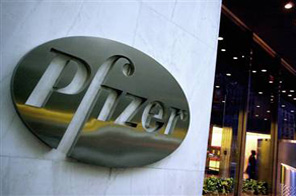Pfizer to announce Nigeria lawsuit settlement
TRENTON: Drugmaker Pfizer Inc. and the Nigerian government have resolved a long-running legal dispute over allegations children there were harmed in a 1996 Pfizer study of an experimental antibiotic during a meningitis outbreak.
The settlement calls for a $75 million payment by Pfizer, according to a person familiar with the negotiations.
That total includes about $35 million to be distributed among victims in the case, $30 million to improve health care in the Nigerian state of Kano, and about $10 million to cover that state's legal costs, according to the source, who requested anonymity because the talks have not been completed.
An official announcement was expected Thursday.
Eleven children died during the two-week test of Trovan, and others were left with brain damage, paralysis, blindness or slurred speech. The Nigerian government argued Pfizer was to blame, while the company countered that it followed proper procedures in the 200-patient study and that any harm was due to meningitis, a deadly bacterial disease endemic in Nigeria.
Kano state led a series of lawsuits against New York-based Pfizer seeking damages - initially requesting more than $5 billion.
The state government and Pfizer in May said they had a tentative agreement, not yet finalised, for Pfizer to pay a $75 million settlement.
Pfizer spokesman Chris Loder confirmed Wednesday that a resolution had been reached but declined to discuss details, saying the agreement was expected to be finalised Thursday.
The resolution "will avoid the continued cost and distraction of litigation, and can help improve and expand health care for the people of Nigeria," Loder said.
He said Pfizer stands by the 1996 study. It "was conducted with the approval of the Nigerian government, consent of the participants' parents or guardians, and was consistent with Nigerian law," he said.
Meanwhile, lawyer Richard Altshuler of West Haven, Connecticut, who said he represents 111 alleged victims jointly with another firm, has been trying to block the settlement, arguing the agreement would shortchange victims and send millions of dollars to Nigerian officials. Altshuler wants to sue Pfizer in the U.S. court system, where his clients might be awarded more money.
He filed legal documents in late May asking a Connecticut judge to halt the portion of the settlement talks that deal with compensation for his clients, but said a hearing on that has been postponed twice and now is set for Aug. 17.
"I think it's encouraging, and it may be a very significant step," he said late Wednesday, toward possible expeditious and amicable resolution of the cases he's handling in U.S. courts. He said he couldn't provide further details.
Loder, the Pfizer spokesman, said Altshuler has no legal basis to prevent Pfizer from negotiating with a foreign government.
He said the lawsuits filed in the U.S. "by purported Trovan study participants are separate and distinct from the cases filed in Nigeria, which the company has sought to settle for many months. The U.S. lawyers' complaints about interference with their cases are unfounded." Trovan was approved by the regulatory U.S. Food and Drug Administration in December 1997.
However, after receiving reports of liver problems associated with long-term use of the drugs, the FDA in 1999 advised doctors to limit Trovan use to patients whose need outweigh those risks.






